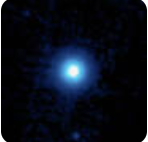The Vega star system is one of the most studied in astronomy due to its proximity, brightness, and unique characteristics that challenge our understanding of planet formation and stellar evolution. Located just 25 light-years away from Earth in the constellation Lyra, Vega is a blue-white star and the fifth-brightest star visible in our night sky. Here's a breakdown of the most intriguing features of the Vega system:
1. Dust Disk Discovery
Infrared Excess: In the 1980s, the Infrared Astronomical Satellite (IRAS) discovered an excess of infrared radiation from Vega, indicating a dust disk around the star. This disk emits infrared radiation as dust particles are heated by Vega's light, suggesting an early model of a protoplanetary or debris disk.
Smooth Disk: Unlike other systems like Fomalhaut, Vega’s disk is remarkably smooth, lacking the gaps and rings typically associated with planets disturbing the dust. This smoothness implies that Vega may lack substantial planetary influences or that planets there may be few and more challenging to detect.
2. Potential "Hot Neptune"
Astronomers have hypothesized that Vega might host a hot Neptune—a large planet orbiting close to the star, with a mass similar to that of Uranus or Neptune. If present, this planet could slightly perturb the disk, though not enough to create the pronounced structures seen in other systems.
3. Asteroid Belt Analogy
Collapse
Observations suggest that Vega may contain a large asteroid belt similar to our Solar System's, with a spread-out disk of rocky material. This possible asteroid belt might add to the dust observed around Vega and could provide insights into the early formation phases of planetary systems.
4. Historical and Cultural Significance
Former Pole Star: Around 14,000 years ago, Earth's axis pointed toward Vega, making it the northern pole star until approximately 12,000 BC. The star held great significance for ancient civilizations due to its prominence.
Name and Mythology: The name "Vega," originally spelled "Wega," comes from the Arabic "Al Nasr al Waki," meaning "Swooping Eagle." Vega is a cornerstone of the Summer Triangle, a prominent asterism for northern hemisphere skywatchers, along with Altair and Deneb.
5. Milestones in Astronomy
First Stellar Spectrum: Vega was the first star to have its spectrum recorded in 1850, helping astronomers study stellar composition and temperature.
Early Photographic Milestone: It was also the second star, after the Sun, to be photographed, marking a major step in astronomical imaging.
6. Variable Star Characteristics
Vega is classified as a Delta Scuti variable, with slight pulsations that cause small changes in its brightness over time. Although minimal, these fluctuations provide valuable data for stellar research and challenge Vega's historic role as a "constant" in brightness.
7. Future Research and Exploration
With its dust disk and potential hot Neptune, Vega remains a prime target for studying alternative pathways in planetary system evolution. Optical spectroscopy allows astronomers to analyze parameters such as star formation rates and chemical composition, shedding light on the processes within Vega's disk and its potential for planet formation.
8. Vega's characteristics—its smooth disk, possible planetary companions, and cultural prominence—continue to intrigue astronomers. Future missions and telescopes may reveal more about this iconic star system, potentially uncovering planets or additional features that reshape our understanding of how stars and planetary systems evolve.
The Vega star system is one of the most studied in astronomy due to its proximity, brightness, and unique characteristics that challenge our understanding of planet formation and stellar evolution. Located just 25 light-years away from Earth in the constellation Lyra, Vega is a blue-white star and the fifth-brightest star visible in our night sky. Here's a breakdown of the most intriguing features of the Vega system:
1. Dust Disk Discovery
Infrared Excess: In the 1980s, the Infrared Astronomical Satellite (IRAS) discovered an excess of infrared radiation from Vega, indicating a dust disk around the star. This disk emits infrared radiation as dust particles are heated by Vega's light, suggesting an early model of a protoplanetary or debris disk.
Smooth Disk: Unlike other systems like Fomalhaut, Vega’s disk is remarkably smooth, lacking the gaps and rings typically associated with planets disturbing the dust. This smoothness implies that Vega may lack substantial planetary influences or that planets there may be few and more challenging to detect.
2. Potential "Hot Neptune"
Astronomers have hypothesized that Vega might host a hot Neptune—a large planet orbiting close to the star, with a mass similar to that of Uranus or Neptune. If present, this planet could slightly perturb the disk, though not enough to create the pronounced structures seen in other systems.
3. Asteroid Belt Analogy
Collapse
Observations suggest that Vega may contain a large asteroid belt similar to our Solar System's, with a spread-out disk of rocky material. This possible asteroid belt might add to the dust observed around Vega and could provide insights into the early formation phases of planetary systems.
4. Historical and Cultural Significance
Former Pole Star: Around 14,000 years ago, Earth's axis pointed toward Vega, making it the northern pole star until approximately 12,000 BC. The star held great significance for ancient civilizations due to its prominence.
Name and Mythology: The name "Vega," originally spelled "Wega," comes from the Arabic "Al Nasr al Waki," meaning "Swooping Eagle." Vega is a cornerstone of the Summer Triangle, a prominent asterism for northern hemisphere skywatchers, along with Altair and Deneb.
5. Milestones in Astronomy
First Stellar Spectrum: Vega was the first star to have its spectrum recorded in 1850, helping astronomers study stellar composition and temperature.
Early Photographic Milestone: It was also the second star, after the Sun, to be photographed, marking a major step in astronomical imaging.
6. Variable Star Characteristics
Vega is classified as a Delta Scuti variable, with slight pulsations that cause small changes in its brightness over time. Although minimal, these fluctuations provide valuable data for stellar research and challenge Vega's historic role as a "constant" in brightness.
7. Future Research and Exploration
With its dust disk and potential hot Neptune, Vega remains a prime target for studying alternative pathways in planetary system evolution. Optical spectroscopy allows astronomers to analyze parameters such as star formation rates and chemical composition, shedding light on the processes within Vega's disk and its potential for planet formation.
8. Vega's characteristics—its smooth disk, possible planetary companions, and cultural prominence—continue to intrigue astronomers. Future missions and telescopes may reveal more about this iconic star system, potentially uncovering planets or additional features that reshape our understanding of how stars and planetary systems evolve.












